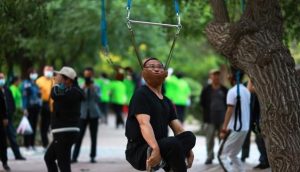
Making Comparisons is one of the purposes of 比 in Chinese Grammar.
Why is Bi important? Well, it’s the most common way for making comparisons in Chinese. Being able to construct 比 sentences will go a long way to enhancing your Chinese skills. The English equivalent of 比 would be “than”. For example, “A is bigger than B” or “A is cheaper than B” and so on. The meaning of 比 is easy to understand. However, its use can sometimes be tricky. This is because the position of A and B can influence interpretation. Read on and we’ll explain!
Basic Comparisons with 比
The basic sentence structure for Bi sentences is: [Noun A + 比 + Noun B + Adjective]. The most important rule for a Bi sentence is that Noun B is being compared against Noun A. This is very subtle but an important fact to remember when interpreting Bi sentences. Noun A, the first noun, is the one that comes out better in the comparison. Here are some example sentences: The adjectives used are positive in relation to the nouns and subject matter. To clarify these key points here are some example sentences:
今年冬天比去年冷。
Jīnnián dōngtiān bǐ qùnián lěng.
It is colder this winter than last winter.
她比我们早离开
Tā bǐ wǒmen zǎo líkāi
She left earlier than us.
Emphatic comparisons with Geng
What if you want to emphasize the comparison between A and B? Well, in that case we use 更 which is like saying “more than”. The sentence structure for this would be: [Noun A + 比 Noun B + 更 + Adjective]. The sentence is the same as before, but this time 更 is put before the adjective. Here are some example sentences:
改写比原著更好。
Gǎixiě bǐ yuánzhù gènghǎo.
The rewrite was much better than the original work.
有时候,主席比总理更有权力。
Yǒushíhòu, zhǔxí bǐ zǒnglǐ gèng yǒu quánlì.
The president sometimes has more power than the prime minister.
Relative Comparisons with Bijiao
What if you want to make relative comparisons? As an adverb Bijiao has the same meaning as “relatively”. For instance, in English, you would say that someone is “relatively tall” or “relatively wealthy”. Unlike Bi sentences, Bijiao sentences don’t require you to make comparisons between A or B. There is usually only one noun. You are not making any specific comparisons, but just stating how the noun compares to the normal standard. Here is an example sentence:
星期天公共汽车比较少
Xīngqītiān gōnggòngqìchē bǐjiào shǎo
there are fewer buses on Sundays
If you want an introduction to some other elements of Chinese grammar then read how to use 了in your Chinese speaking and writing。 Also, If you have any burning Chinese Grammar questions we’ll be happy to answer them on our Quora, we’ll be happy to help!























